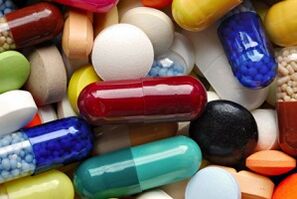Prostate inflammation is a typical feature of mature men after 40 years of age. Pathology is caused by various hormone disorders, viruses or bacteria, weak immune defense, genitourinary system and venereal diseases, and long-term asexual life. Treatment usually does not cause problems, because the pharmaceutical market provides many modern drugs that are effective against prostatitis. Only a qualified urologist can decide which drugs to treat prostatitis for a particular patient.

Drug forms used for prostatitis
The drugs used to treat prostatitis include tablets, suppositories, drips, injections or microcapsules. Tablet formulations are usually represented by antibiotics with a wide range of effects, and are prescribed when the pathological pathogen has not yet been identified. Generally speaking, antibiotic drugs are represented by three types of drugs:
- Fluoroquinolones.
- penicillin.
- tetracycline.
Usually in the treatment of prostatitis, suppositories for rectal use are used (they are inserted into the anus). Such drugs can effectively relieve pain and have antibacterial effects. The injection solution can penetrate the body tissues to the greatest extent. They have a systemic effect, stimulating the immune system and the vascular system.
According to experts, rectal administration can achieve the greatest effect, so it is better than other methods of treating prostatitis.
When drugs are injected directly into the patient's urethral tube, treatment of prostatitis including infusion procedures is not uncommon. Before using the solution, the man needs to empty the bladder. In one procedure, the injected solution does not exceed 5 ml. The main therapy can be supplemented by folk therapies, such as microenemas, in which prostatitis is treated in the form of herbal decoctions or infusions. The micro enema technique is based on complex temperature medicinal effects. This treatment must be done before going to bed, because hypothermia or hypertension of the prostate is unacceptable after the microenema.
Pharmacological group of prostatitis drugs

The treatment of prostatitis is always complicated and includes the use of drugs from various pharmacological groups: antibiotics, analgesics, alpha-receptor blockers, muscle relaxants and hormone-containing drugs, antiviral and anti-inflammatory drugs, and phytotherapy agentsWait. Bacterial etiology, antibiotic drugs are the basis of treatment. The use of tablet antibiotics is usually used for chronic and acute bacterial prostatitis and lasts about one month. In the case of complications of prostatitis, treatment is given by injection of drugs. If the pathogen of the infection cannot be determined, combined antibiotic therapy is given.
Anesthetics significantly promote the progression of prostatitis, but should be taken as directed, because uncontrolled ingestion of analgesics can cause very undesirable side effects. The use of alpha-blockers is due to the relaxing effect of these drugs on the muscles and bladder neck, significantly reducing the pain associated with urination. But these drugs can cause side effects such as hypotension or headaches. Similar drugs are used to treat non-bacterial chronic prostatitis.
Usually, the body of men with prostatitis needs to restore and strengthen the immune defenses, thanks to the drugs in the immunomodulator group, including interferon and other drugs.
It is used to treat prostatitis and muscle relaxants, which can reduce the tension of the perineal muscles. The use of these drugs is due to the tension of these muscles causing discomfort and soreness. The use of hormone-containing drugs in treatment is due to the need to lower testosterone levels, which can cause prostate hyperplasia. As a result of hormone therapy, the intensity of the inflammatory process is reduced and the hormone background normalizes. Sometimes, as an additional treatment for prostatitis, herbal preparations can be used to eliminate swelling, inflammation, and soreness. Herbs are commonly used to treat chronic prostate inflammation.
In the case of viral prostatitis, antiviral drugs are required. Treatment is usually supplemented with non-steroidal anti-inflammatory drugs. The effect of these drugs is to eliminate soreness and swelling, high temperature and the accompanying inflammatory process in the prostate. Suppositories containing anti-inflammatory non-steroidal substances are particularly effective. Medication usually involves the use of drugs that improve blood flow to the prostate.
There are many effective drugs for treating prostate inflammation, but they cannot be prescribed independently, even if there are no contraindications at all.
























